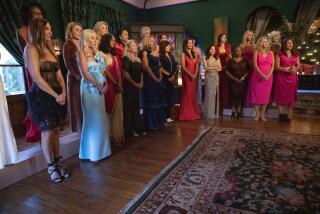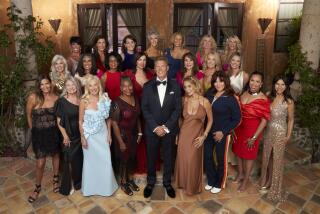It Looked Good on Paper
- Share via
You’ve got to kiss a lot of frogs, contemporary T-shirts insist, to come up with a prince, and anyone eager to see Julia Roberts kissing Richard Gere in “Runaway Bride” will also leave with a bad taste in their mouths.
Ever since “Pretty Woman” topped out as the highest-grossing film of 1990, Hollywood has been desperate to re-team co-stars Roberts and Gere with that film’s genial director, Garry Marshall.
It took the combined efforts of two studios, three executive producers, four producers, three co-producers and who knows how many agents, managers, attorneys and personal assistants to make “Runaway Bride” happen, and in their fiscally sound eagerness to get it done everyone ignored how flawed and unpleasant the film’s conception is. It’s not that sight of the two stars in love isn’t all it’s supposed to be, it’s that all the frog-kissing that audiences will have to do to get there takes a lot of the fun out of the proceedings.
For one thing, “Runaway Bride’s” Josann McGibbon & Sara Parriott script is so muddled and contrived, raising issues only to ignore them or throw them away, you wonder why so many people embraced it. More to the point, pleasant though it is seeing Roberts and Gere interact, the truth is neither one of them is convincingly cast, a situation Marshall’s lethargic, uninspired direction doesn’t improve on.
“Runaway Bride” starts off on the wrong foot by having Gere play rumpled Jimmy Breslin-type New York newspaper columnist Ike Graham. Gere is about as believable at this as Breslin would be playing an American gigolo, and the film further confuses things by trying to convince us, via numerous visual plugs that couldn’t have come cheap, that this Manhattan icon, recognized on every street corner in the big town, writes not for the Times, the News, the Post or even the Village Voice but USA Today.
Desperate for a column idea, Graham does what movie newspaper men have done since time immemorial--he goes to his favorite bar and listens to a story from a talkative drunk. The man tells him about a devious woman from his hometown who has abandoned so many grooms literally at the altar that it’s causing a traffic jam at the church.
A misogynist at heart, Graham writes the story with full name and particulars but without checking a single fact. Not surprisingly he gets lots wrong and when Maggie Carpenter (Roberts), the woman in question, writes to complain, Graham is fired by his current boss and former wife (Rita Wilson).
Seething with rage and thirsting for revenge, Graham decides to visit the cheerful hamlet of Hale, Md., where Carpenter helps run the family hardware store. There he proceeds to make her life a living hell by shadowing her every move and interviewing anyone who ever crossed her path, all in the name of some vague magazine article that is to simultaneously clear his name and besmirch hers.
While Gere’s misogyny is not convincing (though having women periodically whack him with a newspaper is the film’s best running gag), he is, unfortunately, all too believable in behavior that plays like a deranged stalker, not a dedicated journalist. More of a mean-spirited jerk than non-Gere fans will find forgivable, Graham and his smirking, smug condescension give the entire first half of the movie a sour, misanthropic cast it can never fully shake.
Roberts, as she was in the more successful “Notting Hill,” is in full movie-star mode, lithe, smiling and game for all kinds of physical humor, including pratfalls and the making of comically ridiculous faces. This is all great fun, but Maggie is such a terrific person it doesn’t really fit with the film’s need to paint her, at least in part, as someone who has thoughtlessly ruined any number of lives.
Periodically, like a sleeper awakened from a deep repose, “Runaway Bride” tosses in an unconvincing scene purporting to show Maggie doing something dastardly like (horrors!) mildly flirting with the husband of her best friend Peggy (Joan Cusack, delightful as always). But, like the scenes dealing with Maggie’s father’s alcoholism and the pain caused by her family’s verbal potshots, these come out of nowhere and play that way.
It’s a tribute to the often misplaced quality called star power that when, in a notably arbitrary turn of events, Ike and Maggie start to look fondly at each other, we hope it works for the best instead of viewing their potential connection as a national disaster. In a movie filled with improbable sequences, this at least is one we’re happy to see, but erasing the memory of what’s come before is not so easily done.
* MPAA rating: PG for language and some suggestive dialogue. Times guidelines: bad behavior treated with genial forgiveness.
‘Runaway Bride’
Julia Roberts: Maggie Carpenter
Richard Gere: Ike Graham
Joan Cusack: Peggy Flemming
Hector Elizondo: Fisher
Rita Wilson: Ellie
Paramount Pictures and Touchstone Pictures present an Interscope Communications production in association with Lakeshore Entertainment, released by Paramount Pictures. Director Garry Marshall. Producers Ted Field and Tom Rosenberg, Scott Kroopf and Robert Cort. Executive producers Ted Tannebaum, David Madden, Gary Lucchesi. Screenplay by Josann McGibbon & Sara Parriott. Cinematographer Stuart Dryburgh. Editor Bruce Green. Costumes Albert Wolsky. Music James Newton Howard. Production design Mark Friedberg. Art director Wray Steven Graham. Set decorator Stephanie Carroll. Running time: 1 hour, 56 minutes.
In general release.
More to Read
Only good movies
Get the Indie Focus newsletter, Mark Olsen's weekly guide to the world of cinema.
You may occasionally receive promotional content from the Los Angeles Times.









